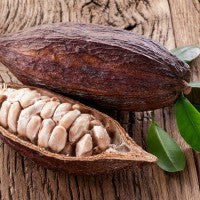Is your chocolate one that you can eat guilt free? And we’re not talking about the sugars and preservatives here.
We speak of chocolate as being the iconic representative in nature of wealth, abundance, and prosperity, yet inconsistencies with human decency and the industrial age of fast paced results show another reality lurking behind the cacao tree. In the summer of 2010 a documentary entitled The Dark Side of Chocolate was released, bringing to light the shocking discovery that slavery and child trafficking was behind some of the largest chocolate empires. Danish Journalist Miki Mistrati goes behind the scenes to investigate cacao plantations in West Africa.
 The documentary starts with Miki at a chocolate trade show in Cologne, Germany interviewing brand representatives on where their cacao is sourced and if they knew of ties with child labor/trafficking. Each representative was appalled at the idea of child imprisonment and believed that their company was in no way involved in such practices. In 2001, the Chocolate Manufacturers Association (and its members) signed a document that prohibited child trafficking and labor in the cocoa industry beyond 2008. Despite this agreement, children are still forced to work on African cocoa plantations.
The documentary starts with Miki at a chocolate trade show in Cologne, Germany interviewing brand representatives on where their cacao is sourced and if they knew of ties with child labor/trafficking. Each representative was appalled at the idea of child imprisonment and believed that their company was in no way involved in such practices. In 2001, the Chocolate Manufacturers Association (and its members) signed a document that prohibited child trafficking and labor in the cocoa industry beyond 2008. Despite this agreement, children are still forced to work on African cocoa plantations.
The biggest producers of cocoa in West Africa are in Cameroon, Nigeria, Ghana, and the Ivory Coast, making up about two-thirds of the world’s entire cocoa production. The Ivory Coast is by far the largest producer; in 2010–11 their entire production rose 8.3%.
Related Product: Organic cocoa powder
The film’s investigation begins in the country of Mali where trafficking of children by way of bribing them with money or flat out kidnapping them was prevalent. The children are taken through the border of Zegoua where they will be shipped off to various cocoa plantations.
The film leads us to the Ivory Coast where there is said to be child labor occurring. Ali Lakiss, CEO and owner of SAF-Cacao (third largest cocoa exporter in the world) was interviewed stating, “I can assure the whole world, not only America and Europe, that the Ivory Coast is a country with no child slaves in the plantations.”
Undercover researchers filmed a plantation on the Northern Ivory Coast clearly showing several children working on the plantation. They soon discovered that children could be bought for the starting price of 230 euros, including transport and indefinite use of the child for labor. It was found later in this journey that at least 65 children had been rescued from captivity in the cocoa plantations and that child labor is a common known fact among the Ivory Coast.
Ali Lakiss was approached by Miki Mistrati after discovering for himself the truth, at which time the SAF-cacao CEO admitted there was indeed a problem with child labor. Major brand name companies were asked to participate in an interview, but they each declined, as may be no surprise to the reader. On January 19, 2010 a response was passed along by the Global Chocolate and Cocoa Industry that explains their stance. One statement says it best, “The majority of cocoa farms are not owned by the companies that make chocolate or supply cocoa and we therefore don’t have direct control over cocoa farming and labor practices.”
It has become shockingly clear that the interests of mega corporations are not congruent with that of the people who support them. When industry fails to accept responsibility for the conditions placed upon those who are made to suffer in order for their enterprise to grow, it is obvious change is needed.
It is not only large companies and unethical plantation owners to blame—we have to look at ourselves to evaluate how we may have contributed to the persistence of such practices in our world. The first world has been tainted with the idea of instant results in large quantities and discounted merchandise or services as a way to get more and give less. Whenever we focus on cutting corners or getting things cheaper, we begin to focus on scarcity which breeds the activities of slavery, which we can clearly see by looking through the history.
The focus on cutting prices for organic food requires the farmer at the bottom of the chain to suffer, resulting in the added probability of taking more drastic measures—in this case slave labor—as a vehicle to keep business moving. Child labor is used to help large scale companies produce vastly inferior chocolate products that contain a number of artificial and health damaging substances; it’s a lose-lose situation on both sides of the equation. When we see cheaply priced products, chocolate in this case, chances are it is of poor quality and slave-labor was involved.
We can all do our part by supporting the raw, organic, and fair-trade movement by diverting our purchasing power. By supporting the raw chocolate trend you are putting your dollars toward community, sustainability, small-business, and higher quality. Most Americans would be shocked if they knew the sweet, tasty chocolate bar they indulge in had slavery attached to it. The only way the extreme unconsciousness of this situation will change is if we, as a community, change.











